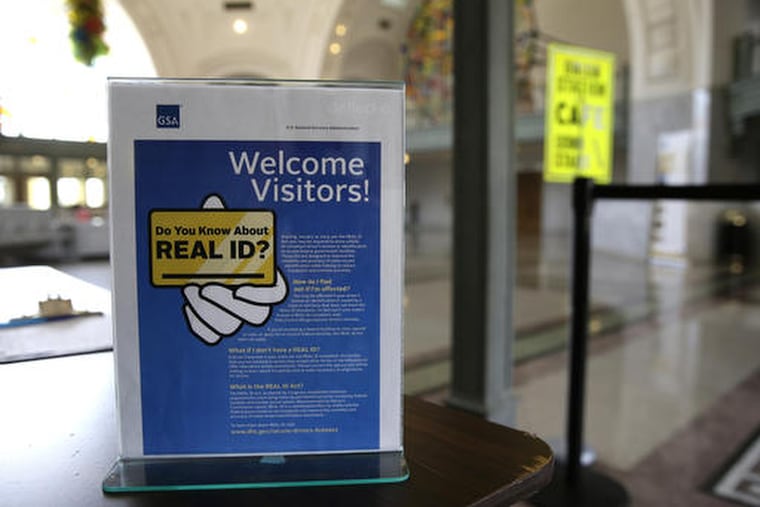What is a REAL ID? Pa., N.J. prepare to follow federal security requirements.
In two years, everyone will need either passports or new federally approved ID cards to board domestic flights and enter federal buildings. Pennsylvania and New Jersey are preparing for what they anticipate will be a deluge of requests for new IDs.

In two years, any Pennsylvania or New Jersey resident who wants to board a domestic flight or enter a federal building must show either a passport or get a new ID card that meets federal post-9/11 security requirements, and Pennsylvania and New Jersey officials say they are preparing for a deluge of ID requests leading up to the deadline.
The two states are among 15 that do not yet comply with the REAL ID act, which Congress passed in 2005 to set uniform security standards for identification cards as recommended by the 9/11 Commission. All 15 have been granted extensions, but Oct. 1, 2020, is the firm deadline for U.S. residents to have identification with the same descriptive information, machine-readable technology, and security features.
By the end of the month, Pennsylvanians will start to see billboards throughout the state about REAL ID. PennDot has begun advertising on TV, radio, and online, and is teaching community groups about REAL ID requirements, and New Jersey plans to do the same. PennDot is giving presentations and working with airports to spread the word.
Pennsylvania plans to begin issuing REAL ID-compliant cards in March, and New Jersey plans to do the same sometime this spring.
"PennDot is very aware that REAL ID can seem confusing, and the department understands that proactive and clear communication is key," Alexis Campbell, a PennDot spokesperson, said in a statement.
Brenda S. "Sue" Fulton, chief administrator of New Jersey's Motor Vehicle Commission, said her agency is planning "customer flow improvements." Her office anticipates at least a tripling of its normal workload in the next year because of the federal ID requirements.
"Our plan is to implement REAL ID with a minimum of disruption to the public, avoiding the long lines that other states have experienced," Fulton said in a statement. "To do this, we plan a series of initiatives to reduce congestion in our motor vehicle agencies," including allowing residents to renew registrations and driver's licenses online in the coming months. She said the state would speed service at Motor Vehicle Commission offices but did not specify how.
Residents wanting REAL ID-compliant cards must prove their identity with documents such as photo IDs, birth certificates, and proof of legal name changes; and provide their Social Security numbers and proof of residency. On the new IDs, states must include residents' names, birth dates, gender, digital photographs, addresses, and signatures, as well as physical security features to prevent tampering or counterfeiting. States must keep copies of the documents used to verify residents' identities.
Unlike New Jersey, Pennsylvania is allowing residents to ask for "pre-verification" of their identifying documents. That way, once the state begins issuing REAL ID-compliant cards in March, pre-verified residents can apply for their cards from home and receive them in the mail within seven to 10 business days, according to PennDot.
"If PennDot can pre-verify as many customers as possible now and those customers can apply for their REAL ID online and not return to a center, that means more efficient service at driver license centers as demand for REAL ID grows," Campbell said.
PennDot has mailed about 4 million postcards to residents who may be eligible to apply for pre-verification online. The department is now mailing a similar postcard to the remaining 7 million residents who need to visit a PennDot office, because they got their IDs prior to September 2003 — when the state began keeping copies of verifying documents.
In the month since PennDot began pre-verifying residents in-person, the state has pre-verified about 9,000 people. Since online pre-verification began this March, PennDot has authenticated the documents of about 52,000 people who applied this way.
Pre-verification is "under consideration" in New Jersey, Fulton said. She did not elaborate.